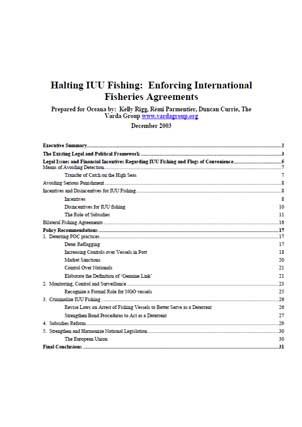Report | May, 2010
Halting IUU fishing: enforcing international fisheries agreements
The world’s fisheries are in crisis. Experts report that 75% are significantly depleted, overexploited or fully exploited. Behind these statistics are the stories of countless families whose livelihoods have been destroyed as the once-bountiful resources of the oceans have dwindled. Governments generally recognise that there is little time left to act decisively to reverse the trends of the last decades. The question is whether the political will exists (and by extension, whether sufficient resources will be made available) to take the necessary measures to do so.
The most important factor undermining the effectiveness of international cooperation and management of fisheries on straddling and highly migratory stocks and fisheries on the high seas is the prevalence of illegal, unregulated and unreported (IUU) fishing.
Oceana has conducted a detailed study (of which this paper is a summary version) into the legal and regulatory frameworks which govern fishing on the high seas which aim to ensure the sustainable management of fisheries resources, but which ultimately perpetuate IUU fishing. It can be concluded from this study that, on paper, there is a complex network of binding and non-binding agreements (‘hard’ and ‘soft’ law) which forms a solid basis in international law for promoting the development of sustainable fisheries, and for preventing or eliminating IUU fishing.
In practice, however, there are weaknesses and loopholes, the most important ones being:
-
Flags of Convenience (FOC), or open registries, allow unscrupulous operators to avoid any regulation of their activities. They fish anywhere and anytime they want to, in contravention of the regulations put in place by Regional Fisheries Management Organizations (RFMOs) to manage and conserve fish stocks.
-
As one country or region more aggressively acts to deter IUU fishing, activities are displaced to another which is less willing or able to do so. As one flag tightens its registry, vessels simply reflag to another less restrictive State. And as more States tighten their registers, new FOC countries emerge.
-
Transshipping at sea means that vessels need never enter ports with their illegally caught fish. The mingling of illegally and legally caught fish onboard reefers essentially serves to whitewash the contraband fish.
-
Monitoring, control and surveillance of the high seas and within the Exclusive Economic Zones (EEZs) of many countries (particularly poorer developing countries) are insufficient to ensure that illegal fishers will be apprehended. Even when they do get caught, bonds and fines are set too low to serve as any kind of deterrent. Such fines are simply considered a cost of doing business; vessels invariably return to the fishing grounds, and carry on as before.
The solutions to these problems are not all easy to implement, but they are clearly identifiable.
The single most effective step to combat IUU fishing would be to close the loophole in international law that allows States to issue flags of convenience to vessels with which they have no genuine link and then fail to exercise control over those vessels. A combination of existing instruments, the negotiation of new instruments, and litigation at the International Tribunal for the Law of the Sea could be used to accomplish this.
Unless and until the FOC system is effectively eliminated, it is important that States do everything in their power to prevent, deter and eliminate IUU fishing through the following means:
- Port State controls: port States must prevent IUU fishing and support vessels from using their harbours for transshipment, resupply and other activities and/or must where possible take action to arrest or detain IUU vessels in the event such vessels enter their ports.
- Market measures: States must adopt and enforce legislation to make it illegal to import or trade in IUU caught fish. Moreover, States should make it illegal or otherwise discourage companies (e.g. insurers, resuppliers, fishing gear manufacturers) from doing business with companies engaged in IUU fishing.
- At-sea transshipment: Flag States must make it illegal for their transport vessels to transship fish caught by vessels engaged in IUU fishing.
- Companies and nationals: States must make it illegal for their nationals and for companies within their jurisdiction to engage in IUU fishing, including the use of fines, penalties and, as necessary, prison sentences of sufficient severity to deter IUU fishing activities.
- Comprehensive management regime for the high seas: IUU fishing not only involves illegally fishing within an EEZ or in contravention of any regional fisheries management organization (RFMO) agreements in place on the high seas. It also includes fishing on the high seas in regions where there is no fisheries management regime in place at all. The problem of fishing (mainly bottom trawling) on seamounts and other deep-sea areas on the high seas, which is largely free of any international management agreement to date, has recently become an issue of international concern. The UN General Assembly is now calling attention to the problem, and its urgency has been widely recognized by fisheries experts.
This paper is derived from the study, focussing in particular on the issues under discussion at the OECD workshop on IUU fishing and providing a wide variety of policy recommendations to help provide fisheries with a sustainable future.




